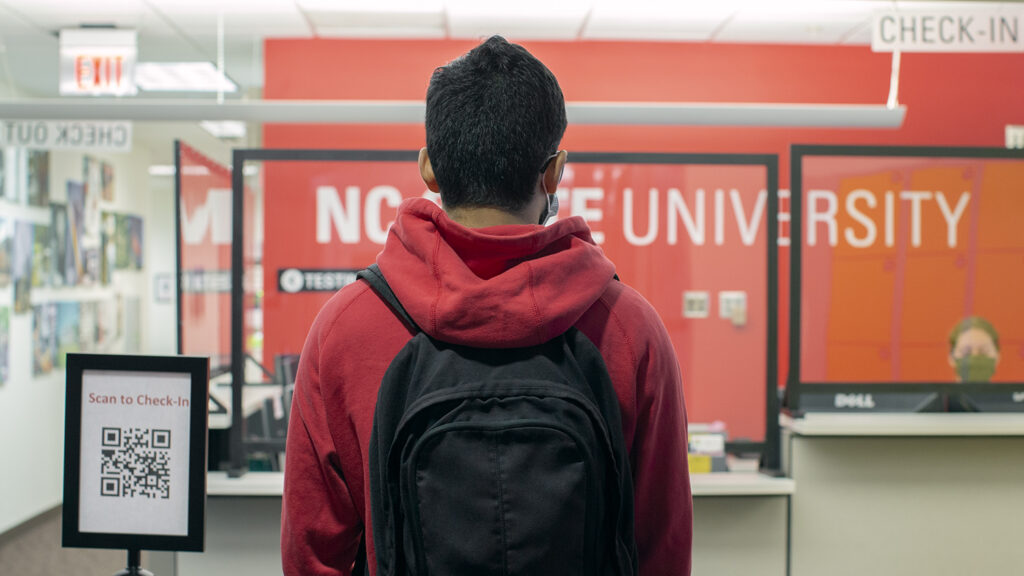By: Maria Gallardo-Williams1, Stacy Gant2, Arlene Mendoza-Moran2
- Office for Faculty Excellence (OFE)
- Digital Education and Learning Technology Applications (DELTA)
Part of the natural evolution of teaching is the need for instructors to adjust to the changing world around us. While there was a time when instructor content could be securely locked away in a drawer (literally), technological advances have made content sharing across online platforms a reality that has intruded into the privacy of the classroom. Students all over the world are sharing homework and exam questions online, and are posting completed papers and assignments that are available for free and for-pay1. In response to the global COVID-19 pandemic, most instructors had to move their content online and offer hybrid courses to meet their students’ needs, which exacerbated the problem2. How are instructors (already overextended) expected to cope with such difficult conditions, some of which even infringe on their copyright?
The purpose of this blog post is not to rail against the unfairness of the situation, or to throw our hands in the air in despair. We thought it would be more helpful to offer some practical solutions that instructors across the world have used to refocus the attention of students and make sites such as Chegg or Course Hero less attractive due to the limited nature of the content available. Some of the strategies that we propose are simple changes that can be implemented with little extra work, while others involve new approaches and a redesign of course elements. We hope that these ideas will be helpful to you as you devise your own solutions to this challenging online landscape.
Immediate Solutions (the low-hanging fruit)
- Re-state and require acknowledgement of the Pack Pledge. At the start of every exam, include the Pack Pledge and require students to acknowledge it. This can be a simple question where they must agree: “I have read and agree to the Pack Pledge.” You should specify what “unauthorized aid” means in the context of each exam.
- Limit the testing time for online exams. Like most learning management systems, Moodle allows you to set an availability window (& an exam duration) for your exams. By limiting the time that students are given to complete the exam, you can focus them on the task at hand and discourage leaving the exam to seek answers on external sites.
- Use a question bank to generate unique exams. Moodle allows you to create question banks from which you can randomly pull unique sets of questions for each student. This tactic, in combination with limiting the testing time, can help focus students on their own work and searching the web for answers will have limited value.
- Ask questions that don’t have easily searchable answers. In addition to, or instead of, having students type or select the answer to a calculated question, ask questions that require students to apply higher-order thinking skills to explain something about it. For example, students can demonstrate their knowledge by describing the steps in the process of solving a problem, justifying their reasoning in choosing one method over another, identifying the mistake in an incorrectly solved problem, identifying missing information needed to solve a problem, etc.
- Have your exams proctored. Many universities have proctoring centers for distance education courses, such as DELTA’s Testing Services. Professional proctors can help ensure that students do not use unauthorized aids during your exam. If your class meets on campus, you or your TAs can proctor your exams on site.
Longer-Term Solutions (the big fix)
- Break exams into smaller, more frequent assessments. Weekly quizzes or small assignments can take the place of an exam grade, and will encourage students to practice and review class material more often. While preparation for a large test can be very stressful for students and might lead to the short-term fix of visiting a website that facilitates cheating, sustained preparation for smaller graded opportunities will result in more engagement and fewer instances of academic dishonesty.
- Convert exams into an open-book or open-note format. Open-book/open-note exams reduce test anxiety (a major driver of cheating) and encourage application-based learning. We can use this type of exam to show our students that we trust their ability as adult learners to use sources of information appropriately, and it also gives us the opportunity to ask higher order thinking questions, which will require the students to engage with the material in a more authentic way.
- Personalize class content. If you want students to produce original content,
make it personal. In most fields you can ask students to pick a subject that has a personal or professional connection to their interests, and use that as a starting point for assignments or projects. This can be as simple as asking students to reflect on the application of a class concept based on their self-described views. - Use live or recorded presentations. Presentations are a great alternative to exams, since students will need to achieve a certain level of mastery of course material in order to present on a topic. Live presentations can be done during class time, or recorded presentations can be used in order to facilitate asynchronous participation. Time limits on recorded presentations can be used to keep grading manageable.
- Promote a positive learning environment. As the instructor of the course, the way you choose to run your class shapes the way the course is perceived by your students. Simple things such as encouraging multiple attempts on assignments, setting up peer learning opportunities, or placing less emphasis on summative assessments can signal to students that you value engaged, authentic learning3 and that you are invested in their success in your class and beyond.
There are some useful resources, including how to set up some of the suggested solutions in this presentation from DELTA: Moodle Quiz Settings Best Practices for Promoting Academic Integrity (Arlene Mendoza-Moran). Instructional consultations are also available with DELTA and OFE.
